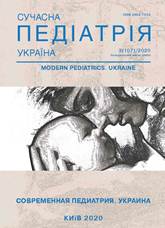Quality of life in children suffering from acute leukemia
Keywords:
children, quality of life, acute leukemiaAbstract
Acute leukemia is still one of the most complex and urgent problems of pediatric hematology due to the increasing incidence of the disease, the severity of the disease, the complexity of therapy and its possible complications that aggravate the prognosis of the disease. The quality of life of a child suffering from an oncohematological disease includes a subjective assessment of his well-being, which is more important for him than objective indices.The aim: obtaining individual information about the child's reaction to the disease and performing polychemotherapy for assessment of not only the indices of physical, but also the psychological, emotional and social condition.
Materials and methods. With the help of special questionnaires, physical, social, emotional activity and activity in kindergarten/school of children suffering from acute leukemia in the period of remission were assessed.
Results. All forms of activity in children suffering from acute leukemia were more or less disturbed even in the remission phase.
Conclusions. Assessment of quality of life is an important criterion for determining the effectiveness of treatment, and it must obligatory be performed in oncohematological patients, since even in the remission phase they need psychological support.
The research was carried out in accordance with the principles of the Helsinki Declaration. The study protocol was approved by the Local Ethics Committee of an institution. The informed consent of the patient was obtained for conducting the studies.
No conflict of interest was declared by the authors.
References
Bai G, Herten MH, Landgraf JM, Korfage IJ, Raat H. (2017). Childhood chronic conditions and health-related quality of life: Findings from a large population0based study. PLoS ONE. 12(6): 1–14. https://doi.org/10.1371/journal.pone.0178539; PMid:28575026 PMCid:PMC5456082
Novik AA, Ionova TI. (2012). Guidelines for the study of the quality of life in medicine. 3rd ed. Revised. and enlarged. Ed. Yu.L. Shevchenko. M.: 528.
Odinets YuV, Makieieva NI, Poddubnaya IN. (2016). Scientific work «Questionnaire for parents of children aged 2–5 years suffering from acute leukemia (supplement to the medical card of an inpatient or history of the child)». Author's certificate No. 66942 d/d 18.10.2016.
Odinets YuV, Makieieva NI, Poddubnaya IN. (2017). Scientific work «Questionnaire in two parts. I. For children aged 5–8 years suffering from acute leukemia; II. For parents of children aged 5–8 years suffering from acute leukemia (supplement to the medical card of an inpatient or history of the child)». Author's certificate No. 69202 d/d 03.01.2017.
Odinets YuV, Makieieva NI, Poddubnaya IN. (2017). Scientific work «Questionnaire in two parts. I. For children aged 8–12 years suffering from acute leukemia; II. For parents of children aged 8–12 years suffering from acute leukemia (supplement to the medical card of an inpatient or the history of the child's development)». Author's certificate No 71337 d/d 07.04.2017.
Odinets YuV, Makieieva NI, Poddubnaya IN. (2017). Scientific work «Questionnaire in two parts. I. For children aged 12–18 years suffering from acute leukemia; II. For parents of children aged 12–18 suffering from acute leukemia (supplement to the medical card of an inpatient or history of the child)». Author's certificate No. 74572 d/d 07.11.2017.
Varni JW. (2017). Pediatric Quality of Life Inventory™ (PedsQL™) Mapi Research Trust: 146.
Vilchevskaya EV, Kolomenskaya SA, Marchenko EN. (2014). Acute leukemia in children. Child's health. 6 (57): 113–117.
Wang Z, Mo L, Jiang X et al. (2018). A quality-of-life system to evaluate children with leukemia in China. Medicine. 97(36): 12119. https://doi.org/10.1097/MD.0000000000012119; PMid:30200097 PMCid:PMC6133475
World Health Organization (1986). Cancer pain relief. Geneva: WHO: 5–26.
Downloads
Issue
Section
License
The policy of the Journal “MODERN PEDIATRICS. UKRAINE” is compatible with the vast majority of funders' of open access and self-archiving policies. The journal provides immediate open access route being convinced that everyone – not only scientists - can benefit from research results, and publishes articles exclusively under open access distribution, with a Creative Commons Attribution-Noncommercial 4.0 international license (СС BY-NC).
Authors transfer the copyright to the Journal “MODERN PEDIATRICS. UKRAINE” when the manuscript is accepted for publication. Authors declare that this manuscript has not been published nor is under simultaneous consideration for publication elsewhere. After publication, the articles become freely available on-line to the public.
Readers have the right to use, distribute, and reproduce articles in any medium, provided the articles and the journal are properly cited.
The use of published materials for commercial purposes is strongly prohibited.

